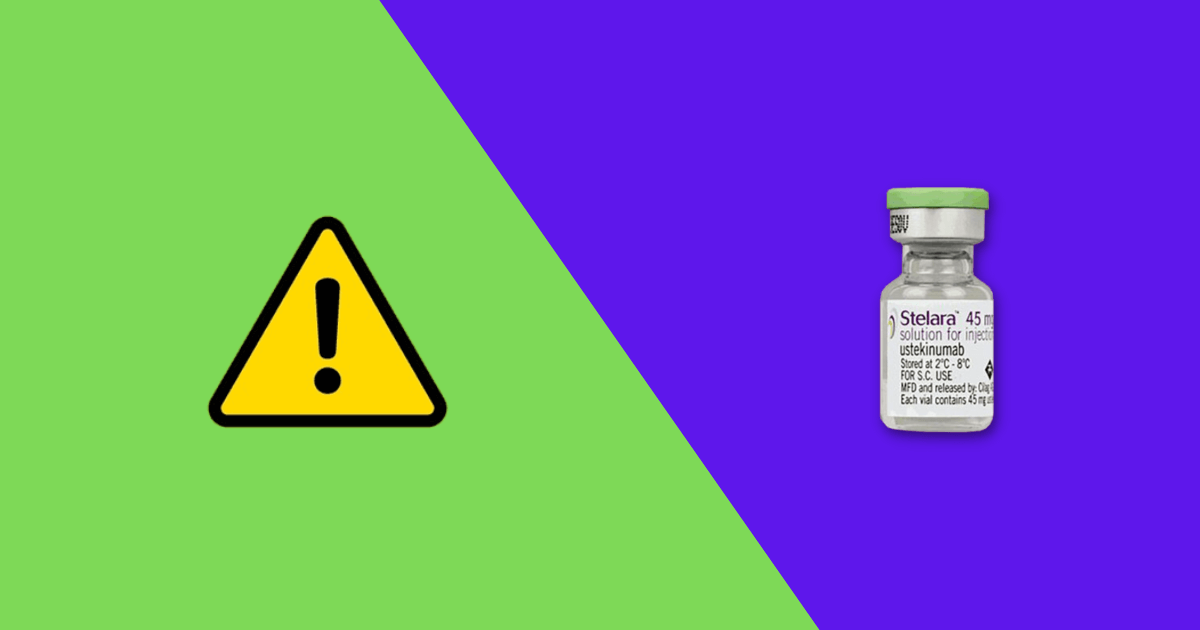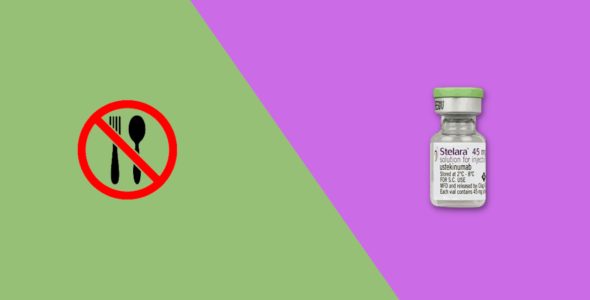Stelara side effects and how to avoid them
Table of contents
Stelara is an FDA-approved medication manufactured by Janssen Biotech, Inc. It is classed as a biologic immunosuppressant used to treat inflammatory diseases. While Stelara is generally well tolerated, there are some potential side effects that people should be aware of. The most common side effects of Stelara include injection site reactions and infections. Less common, but more serious side effects, can include serious allergic reactions.
Learn more about the side effects of Stelara and what you can do to avoid them.
What is Stelara (ustekinumab)?
Stelara is specifically an interleukin-12 and interleukin-23 inhibitor drug containing the active ingredient ustekinumab. It is used to treat inflammatory diseases such as:
- Moderate to severely active Crohn’s disease in adults
- Moderate to severely active ulcerative colitis in adults
- Moderate to severe plaque psoriasis in adults and children 6 years of age and older who may benefit from systemic therapy or phototherapy
- Active psoriatic arthritis in adults (alone or with the drug methotrexate)
Crohn’s disease is caused by inflammation of your gastrointestinal tract. Inflammation can occur along any part of your gastrointestinal tract. It can cause stomach pain, diarrhea, fever, weight loss, tiredness, and even anemia and arthritis.
Ulcerative colitis causes inflammation and ulcers to form in your colon and rectum (your large intestine). It can cause abdominal pain, diarrhea, fever, weight loss, and anemia.
Psoriasis is a chronic autoimmune disease that can also cause inflammation. Plaque psoriasis is a skin condition caused by the speeding up of the lifecycle of skin cells. Cells build up on the surface of your skin, resulting in red patches covered in white to silver scales. These patches can occur in a few spots or they can cover large areas of your body.
Psoriatic arthritis happens when psoriasis causes your joints to become inflamed. It can be painful, and it can cause swelling that can damage the joints over time and lead to deformation. Psoriatic arthritis can affect any joint, but it’s most common in the fingers and toes.
Stelara helps with these conditions by reducing the amount of inflammation your immune system can cause. This can provide relief from symptoms and reduce any damage chronic inflammatory diseases may cause.
The active ingredient ustekinumab is a monoclonal antibody, which means it’s a kind of protein that binds with other specific proteins in your body. Ustekinumab works by binding with proteins produced by your immune system called cytokines. These proteins help to trigger your body’s inflammatory response. By binding with them, ustekinumab stops them from working, reducing the amount of inflammation your immune system causes.
Always check with your doctor or pharmacist before taking any medication, including Stelara, to make sure it is safe for you.
Stelara dosage
Stelara is available as a subcutaneous Injection: 45 mg/0.5 mL or 90 mg/mL in a single-dose prefilled syringe, injection: 45 mg/0.5 mL in a single-dose vial, or as an intravenous Infusion: 130 mg/26 mL solution in a single-dose vial.
Inject Stelara by subcutaneous injection using either a pre-filled syringe or an injectable pen. It is important to use a new needle each time to prevent the risk of infection. You may get injection site reactions such as redness, bruising, or irritation after administration, but this will settle down after a few hours. Your pharmacist or other healthcare providers can teach you how to give injections at home.
If you use Stelara to treat Crohn’s Disease, you will receive your first dose as an hour-long intravenous infusion in a medical setting by a healthcare professional. Your next doses will all be subcutaneous injections.
You are advised to read the prescribing information and medication guide provided with this medicine for the drug information and patient information, and always speak with your healthcare provider for medical advice about any changes to your dose so they can monitor and evaluate your condition.
What are the side effects of Stelara?
The most common possible side effects of Stelara include:
- Tiredness
- Headaches, dizziness
- Injection site reactions – itching, pain, redness or discoloration of the skin
- Nausea, vomiting
- Upper respiratory infections – common cold, bronchitis, sore throats, or sinus infection
- Urinary tract infections
- Vaginal yeast infections
- Joint pain
Stelara can cause more serious side effects, including:
- A rare (sometimes fatal) condition called PRES (posterior reversible encephalopathy syndrome) – new or worsening headaches, seizures, vision problems, and confusion
- Serious heart symptoms such as fast or irregular heartbeats, shortness of breath, sudden dizziness, feeling lightheaded, or faint
- Suppression of the immune system
- Serious allergic reactions – feeling faint, swelling of your face, tongue, or throat, a tight chest, or skin rash
- Serious infections such as tuberculosis – symptoms include fever, night sweats, loss of appetite, weight loss, and constant tiredness
If you experience any of these serious side effects, stop taking Stelara and seek medical help immediately. You are encouraged to report negative side effects of prescription drugs to the FDA. Visit www.fda.gov/medwatch, or call 1-800-FDA-1088.
Does Stelara cause weight gain?
No, Stelara shouldn’t cause weight gain. Weight gain isn’t a reported side effect in studies for this drug.
Are there side effects of stopping Stelara?
No, stopping to take Stelara shouldn’t cause side effects. However, the condition you’re taking Stelara to treat may return or worsen.
Does Stelara cause any changes in mood or anxiety?
You shouldn’t experience any changes in mood or anxiety while taking Stelara. These are not reported side effects in studies of people taking this drug.
Stelara drug interactions
Stelara can interact with other medications including:
- Other immunosuppressant drugs
- Other psoriasis or psoriatic arthritis treatments, including UV light therapy
- Live vaccinations
- CYP450 substrate medicines, like warfarin or cyclosporine
Before taking Stelara, be sure to tell your doctor about all of the medications you are taking to ensure they are safe to take at the same time.
Stelara warnings & precautions
Don’t take Stelara if you:
- Are allergic to the active ingredient ustekinumab
- Are allergic to any of the other ingredients in Stelara
- Are allergic to latex (the needle cover on the prefilled syringe contains latex)
- Have an active infection
- Are under 12 years of age
Talk to your doctor before taking Stelara if you:
- Have ever had any type of cancer (malignancies) including skin cancer
- Have recently had a live vaccine
- Have had a recent infection
- Have any new or changing lesions within psoriasis areas or on normal skin
- Are currently having another treatment for psoriasis or psoriatic arthritis
- Are currently having, or have had, injections to treat allergies
- Are over 65 years of age
- Are pregnant or trying to become pregnant
- Are breastfeeding or plan to breastfeed – This drug may pass into breast milk
You should always check with your doctor or pharmacist before taking any medication, including Stelara, to make sure it is safe for you.
How to avoid Stelara side effects
The best way to avoid side effects is to take Stelara as directed by your doctor. Follow your doctor’s instructions carefully and do not take more or less than prescribed.
If you experience any side effects, talk to your doctor or pharmacist. They may be able to recommend ways to help reduce or prevent some of the side effects.
1. Stick to the recommended dosage
Take your prescribed dose of Stelara that has been recommended by your healthcare professional. Do not take more or less than prescribed.
2. Monitor your blood sugar levels
If you have diabetes, it is important to monitor your blood sugar levels closely while taking Stelara. Check your blood sugar levels as directed by your doctor and report any changes to your doctor immediately.
3. Drink plenty of fluids
Drink eight to 10 glasses of water or fluids every day to help prevent dehydration, which can make side effects worse.
4. Avoid alcohol
There are no known interactions between Stelara and alcohol. You are advised however to not consume alcohol excessively while using Stelara.
5. Don’t skip meals
Eating regular meals and snacks will help to prevent low blood sugar levels (hypoglycemia).
6. Check your feet
If you have diabetes, check your feet for any cuts, sores, or redness regularly. Tell your doctor if you experience any problems with your feet while taking Stelara.
7. Know the signs and symptoms of Stelara side effects
Signs and symptoms of side effects include upper respiratory infections. If you experience any of these symptoms speak to your doctor for medical advice.
8. Monitor your weight
Stelara does not cause weight gain. If you experience changes in your weight while taking Stelara, get medical advice from your doctor.
9. Tell your doctor about all medications you’re taking
Be sure to tell your doctor about all other medications you’re taking, including over-the-counter drugs, vitamins, and herbal supplements, as they can interact with Stelara.
10. Get regular medical check ups
It is important to get regular medical check ups and monitor your medical conditions. Your doctor will monitor your side effects and may adjust your dose of Stelara as needed.
Medically reviewed
A medical professional has reviewed this article.


Jamie Winn, PharmD
Jamie Winn, PharmD
Dr. Jamie Winn received his Doctor of Pharmacy in 2002 from the University of South Carolina College of Pharmacy, Columbia, SC. Jamie is a medical reviewer for NiceRx.



